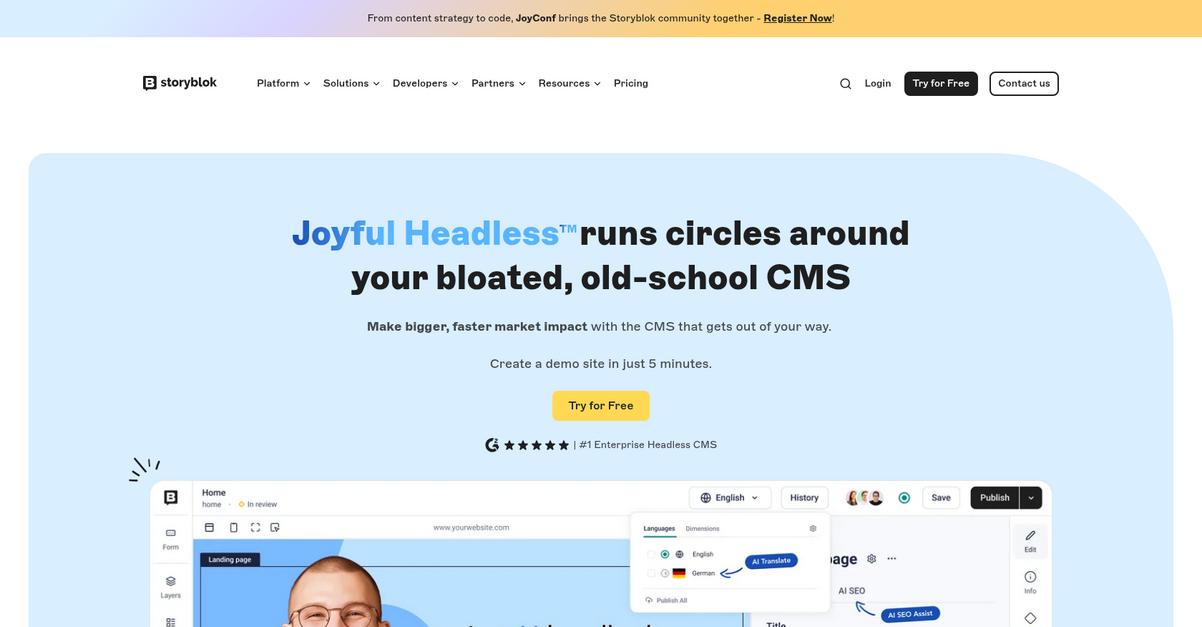Stuck with a monolithic ecommerce platform?
Traditional platforms often force you into rigid templates, making it hard to create unique experiences or adapt to new customer touchpoints.
The bigger challenge is avoiding vendor lock-in while trying to integrate with your existing PIM and OMS systems without costly development cycles.
Evaluating your options is just confusing. You’re forced to sort through conflicting claims about “true headless” capabilities and hidden fees that threaten your budget.
The solution is to build a truly modular stack that gives you complete control and flexibility without needing a huge development team.
In this guide, I’ll break down the best headless ecommerce platform choices to help you find the right foundation for your specific modular architecture.
You will gain the clarity to select a platform that supports both B2B and DTC workflows while avoiding those long-term implementation headaches.
Let’s dive in.
Quick Summary:
| # | Software | Rating | Best For |
|---|---|---|---|
| 1 | BigCommerce → | Mid-market B2B & B2C | |
| 2 | Shopify → | SMBs with global sales | |
| 3 | commercetools → | Enterprise B2B & B2C | |
| 4 | Swell → | Growing mid-market firms | |
| 5 | fabric → | Mid-market multi-region retail |
1. BigCommerce

Struggling with headless commerce platform evaluation?
BigCommerce offers both low/no-code and headless options, or a hybrid, addressing diverse implementation needs. This means you can tailor the solution to your existing team’s capabilities.
Their B2B Edition, for instance, tackles the complexities of B2B e-commerce, offering the scalability and flexibility you need to transform your operations, allowing you to streamline quoting and invoicing, and manage multiple channels. This gives you full control.
You can truly shape your future.
BigCommerce solves challenges by providing a flexible, professional-grade e-commerce platform built to scale for your specific business needs. This platform empowers you to grow bigger.
This means you get operational excellence, empowering your sales reps with efficiency and enabling you to operate both B2B and B2C channels from one platform. You can also localize experiences, lowering costs and risks.
Additionally, BigCommerce boasts solutions like Multi-Storefront to manage unique stores from one account, and Catalyst for launching fully optimized, high-performing storefronts. You also get 130+ payment providers for a frictionless shopper experience, ensuring improved conversion and revenue for your business.
This freedom allows you to grow with confidence.
Key features:
- Hosted low/no code and headless options: Provides flexibility to choose the right architecture for your business, supporting diverse development needs and team skill sets.
- B2B Edition and Multi-Storefront: Tailored features for complex B2B operations and the ability to manage multiple unique stores from a single account, simplifying expansion.
- Catalyst for optimized storefronts: Allows you to launch high-performing, visually stunning storefronts quickly, enhancing customer engagement and conversion rates.
Learn more about BigCommerce features, pricing, & alternatives →
Verdict: BigCommerce stands out as a strong candidate for the best headless ecommerce platform, offering a flexible and scalable solution for mid-market businesses. Its robust B2B capabilities, multi-storefront management, and comprehensive payment options ensure operational efficiency and a better buyer experience, supporting your modular commerce stack goals.
2. Shopify

Is your current commerce platform holding you back?
Shopify’s powerful APIs and headless framework, Hydrogen, empower you to build custom storefronts that truly adapt to your unique brand vision. This means you can say goodbye to rigid templates and gain the flexibility you need.
You can create a modular stack, addressing pain points like limited customization and achieving true headless capabilities without vendor lock-in.
Unlock your brand’s full potential.
Shopify helps you overcome information overload by offering clear, robust solutions for complex needs. You can sell online, in person, globally, and even manage B2B and wholesale channels from one centralized admin.
Key features like Shopify Markets simplify international selling by handling complexities like localization, while Shopify POS keeps your online and offline sales perfectly in sync. Plus, with Shopify’s developers constantly innovating and shipping over 150 new features every six months through Editions, you’ll always have access to cutting-edge technology like AI-powered content generation via Shopify Magic, ensuring your store is strong, fast, and successful.
Manage your entire business with confidence.
Key features:
- Custom Storefronts: Build unique, brand-aligned online experiences using powerful APIs and the Hydrogen headless commerce framework for ultimate flexibility and control.
- Omnichannel Selling: Seamlessly manage sales across online stores, in-person via Shopify POS, social channels, and even B2B/wholesale, all from one centralized platform.
- Global Commerce & Operations: Simplify international selling with Shopify Markets for localized experiences, efficient shipping solutions, and AI-driven tools to streamline content and management.
Learn more about Shopify features, pricing, & alternatives →
Verdict: Shopify’s comprehensive suite of tools, from its headless capabilities with Hydrogen to robust B2B and global selling features, positions it as a strong contender for the best headless ecommerce platform. Its commitment to continuous innovation, with over 150 new features shipped every six months, ensures your business stays at the cutting edge and avoids common integration and scalability challenges.
3. commercetools

Struggling to build your adaptable commerce stack?
You need a platform offering true API flexibility to meet your unique business requirements. This means you can create highly customized experiences.
This flexibility ensures you’re not locked into rigid templates, allowing your team to innovate rapidly and respond to market changes.
Here’s how commercetools empowers you.
commercetools provides a commerce engine that easily integrates into your existing PIM and OMS systems. This gives you unmatched freedom and control.
Their API-first architecture supports complex catalog management and advanced B2B workflows, handling both B2B and B2C experiences seamlessly.
Additionally, this approach helps reduce your dependency on internal development teams, freeing them to focus on innovation. You can build, integrate, and scale exactly as needed, ensuring your modular stack truly adapts without forced migrations.
This leads to true innovation.
Key features:
- API-first architecture: Provides the ultimate flexibility for building unique commerce experiences and integrating with your existing enterprise systems.
- Modular components: Allows you to select and combine specific commerce functions, enabling a composable approach tailored to your exact business needs.
- B2B and B2C readiness: Supports complex multi-vendor and multi-channel scenarios, empowering both direct-to-consumer and business-to-business operations.
Learn more about commercetools features, pricing, & alternatives →
Verdict: If you’re seeking the best headless ecommerce platform that delivers true API flexibility, commercetools stands out. Its modular design supports complex B2B and B2C use cases, helping you avoid vendor lock-in and significantly reduce dependency on your internal development teams.
4. Swell

Struggling to find an ecommerce platform that truly adapts to your needs?
You need flexibility that handles API complexities, B2B/B2C demands, and avoids vendor lock-in. Swell’s powerful APIs allow you to create multiple storefronts for any architecture and tech stack, giving you the freedom you need.
This means you gain unlimited options and variants for your products, supporting unique business models like configurable bundles or subscription services.
That sounds like a breath of fresh air.
Swell solves the problem of information overload and conflicting claims about “true headless” by offering radical data flexibility. You can add fields to standard models or create entirely new ones to store business data and content together.
This allows for complex product configurations without hassle, providing flexible product variation modeling with selectable values and open-ended text inputs. You can manage inventory, pricing, and images for each SKU separately. Plus, Swell’s intuitive dashboard gives your team a single UI to process orders from any channel, manage customer data, and generate essential reports.
The result is a modular commerce stack that evolves with your business.
Key features:
- Headless Storefronts & Flexible APIs: Build multiple, customized storefronts using powerful APIs compatible with any tech stack, ensuring true headless capabilities.
- Comprehensive Product Modeling: Offer configurable products, bundles, and subscriptions with unlimited options and variants, enabling complex product setups easily.
- Unified Operations Dashboard: Manage all aspects of your store, from orders and customers to subscriptions and promotions, through an intuitive, centralized interface.
Learn more about Swell features, pricing, & alternatives →
Verdict: Swell stands out as a best headless ecommerce platform, offering robust API flexibility and comprehensive features to address the pain points of tech decision-makers in growing mid-market businesses. Its radical data flexibility and unified dashboard simplify complex B2B/B2C operations and direct-to-consumer experiences, providing a scalable and adaptable solution.
5. fabric

Is your order management stifling growth and customer satisfaction?
fabric offers an AI-powered Order Management System (OMS) that provides a unified, real-time inventory view to meet demand efficiently.
This addresses the pain point of scattered inventory data, allowing your business to fulfill orders from the most optimal location.
Here’s how you can transform your operations.
fabric’s AI Order Cloud connects demand with complex fulfillment. This means you get a real-time, unified view of inventory across all your demand channels and fulfillment locations.
This system is designed to scale for multi-region, multi-brand retail businesses. Furthermore, it offers smart order fulfillment with automated insights to reduce split shipments, giving operators configurable UI control without needing developers.
Additionally, you can launch flexible store fulfillment options like BOPIS (Buy Online, Pick Up In Store) and Ship From Store, managing orders efficiently with an enterprise-grade app. Plus, the integrated ecosystem seamlessly connects with your existing commerce tools.
The result is a superior customer experience.
If you’re building a modular stack, finding the best Autodesk partner can streamline your design and support processes.
Key features:
- AI-powered OMS: Provides a unified, real-time inventory view across all demand channels and fulfillment locations, scaling for multi-brand retail.
- Smart Order Fulfillment: Automates insights and actions to reduce split shipments, offering operators full control through a configurable no-code UI.
- Flexible Store Fulfillment: Supports BOPIS, Ship From Store, and other methods with an easy-to-use enterprise app, optimizing order management.
Learn more about fabric features, pricing, & alternatives →
Verdict: fabric stands out as the best headless ecommerce platform for mid-market businesses prioritizing advanced order management and customer experience. Its AI-powered OMS, coupled with real-time inventory visibility and flexible fulfillment options, ensures a modular stack that adapts to evolving channels and reduces dependency on internal development teams, as validated by enterprise retailers like Chico’s FAS.
6. Elastic Path

Is your commerce platform holding you back?
Elastic Path offers a truly composable commerce solution, providing you with incredible flexibility.
This means you can build a unique solution that adapts to your evolving needs, letting you innovate without limitations.
Unlock true commerce agility today.
Elastic Path provides the freedom to launch new channels, brands, and business models quickly. You gain a competitive edge by adapting to market changes faster than your rivals.
Their API-first approach and extensive ecosystem of pre-integrated solutions mean you can seamlessly connect with your existing systems like PIM and ERP. This reduces implementation complexity and ensures your current technology investments are maximized. Plus, with the ability to manage complex pricing, promotions, and product catalogs effortlessly, you can deliver tailored experiences for both B2B and B2C customers, ensuring your operations scale with your growth.
Deliver truly unique buying experiences.
While discussing your tech stack, understanding data center management software can further optimize your infrastructure.
Key features:
- Composable Commerce: Gain API-first flexibility to integrate with any front-end or third-party service, enabling a truly modular and adaptable commerce stack.
- Unified Platform: Manage diverse business models—B2B, B2C, subscriptions, and marketplaces—all from a single, robust platform designed for scalability.
- Extensive Ecosystem: Access pre-built integrations and a vast partner network to connect seamlessly with your existing PIM, ERP, and marketing automation tools.
Learn more about Elastic Path features, pricing, & alternatives →
Verdict: Elastic Path stands out as a strong contender for the best headless ecommerce platform, especially if you prioritize API flexibility, comprehensive B2B/B2C capabilities, and a modular approach. Its composable architecture helps avoid vendor lock-in and integrates seamlessly with your existing systems, ensuring long-term scalability and reducing dependency on internal development teams.
7. Saleor

Struggling to build a truly flexible commerce stack?
Saleor offers a powerful, headless, and API-first backend to help you compose your ideal commerce solution. This means you can create a custom experience without vendor lock-in.
You get a flexible data model and an open app ecosystem, so you can integrate with your existing systems and extend functionality as your business needs evolve. This lets you adapt to ever-changing business requirements.
Here’s how Saleor simplifies things.
You can leverage built-in commerce modules like Products, Promotions, and Checkout to compose your perfect stack. This ensures you have full control over your commerce experience.
Their unrivaled extensibility allows you to extend your commerce with apps written in any framework and language using Saleor’s tech-agnostic API. Plus, the user-friendly dashboard provides a centralized hub for merchants, support, and other teammates, which you can expand with custom apps. Lush, for instance, uses Saleor to power its entire global e-commerce operation across 50+ countries and 25+ channels. This makes it ideal for global operations, supporting B2B and D2C simultaneously.
This allows you to build the commerce you want, the way you want it.
Key features:
- Composable Commerce Engine: Utilize modular components like Product Information Management, Promotions, and Order Management to build a tailored commerce solution without being forced into a rigid platform.
- Unrivaled Extensibility & Open Apps: Extend your commerce with custom apps in any framework or language using Saleor’s tech-agnostic API and leverage a broad ecosystem for payments, shipping, and more.
- Global & Multi-Channel Readiness: Power operations across borders with features like multi-currency support, channel management, and content translation, perfect for B2B, D2C, and multi-storefront strategies.
Learn more about Saleor features, pricing, & alternatives →
Verdict: Saleor’s powerful, extensible API-first architecture positions it as a strong contender for the best headless ecommerce platform, especially for growing mid-market businesses. Its composable nature, demonstrated by brands like Lush managing 17k+ products across 50+ countries, allows you to build highly customizable and scalable commerce solutions while avoiding vendor lock-in and integrating seamlessly with your existing stack.
8. Spryker

Are rigid platforms limiting your growth?
Spryker offers a modular, headless cloud platform-as-a-service, designed to help you differentiate and scale your transactional business. This means you can launch new business models and iterate with ease.
Their platform provides industry-leading capabilities and ready-to-go partner apps to accelerate time-to-value. You can meet sophisticated business needs with upgrade-safe extensibility, without being tied down by monolithic technologies.
Discover true modular commerce.
Spryker solves the problem of rigid commerce systems by providing a flexible, API-first approach that integrates with your existing operations. You can connect unlimited touchpoints, supporting various business models and use cases, all from one platform.
This enables faster time-to-value by allowing you to launch quickly and iterate easily with their agnostic, API-first digital commerce platform. You can automate and optimize your business processes, increasing efficiency through unmatched platform extensibility.
Additionally, Spryker helps you unlock new revenue streams by enabling you to test, launch, and scale new digital commerce business models with agility, turning market volatility into value. This comprehensive solution avoids vendor lock-in, ensuring seamless integrations.
Your business, more benefits.
Speaking of robust platform solutions, you might also find my analysis of long term care software helpful for specific operational needs.
Key features:
- Modular and Headless Architecture: Spryker offers a customizable commerce stack with next-generation cloud capabilities, enabling you to connect unlimited touchpoints with an API-first approach for B2B, B2C, or marketplace needs.
- Accelerators and Composable Commerce: Leverage pre-built accelerators and packaged business capabilities (PBCs) to speed up market entry and reduce the total cost of ownership by building a best-of-breed digital commerce stack.
- Multi-Model Support and Extensibility: The platform supports multiple business models and use cases, including unified commerce and IoT commerce, providing upgrade-safe extensibility to meet sophisticated business needs and scale with your business.
Learn more about Spryker features, pricing, & alternatives →
Verdict: Spryker stands out as a strong contender for the best headless ecommerce platform because of its modular design and API-first approach, perfect for mid-market businesses seeking flexibility. Their enterprise marketplace capabilities and support for diverse use cases like B2B and D2C, as demonstrated by Siemens Healthineers achieving over 90% use case fulfillment, make it an adaptable and future-proof choice.
9. Storyblok

Tired of your bloated, old-school CMS?
Storyblok offers an API-first, component-based platform for delivering content, freeing your development team to focus on what they love. This means you can customize your stack using technologies like Next.js, Astro, Nuxt, React, and more.
Your development time can be significantly reduced by building projects in your preferred framework in just minutes, accelerating your market impact. You can also easily create global components and flexible content structures, avoiding vendor lock-in.
Here’s how Storyblok empowers your team.
It delivers an intuitive editing experience for marketers, featuring drag-and-drop components and on-page collaboration. This significantly speeds up content operations and helps create, manage, and optimize content that converts. You’ll experience reduced development time and increased content creation speed.
Additionally, for enterprises, Storyblok provides ISO 27001 certified security and a 99.99% uptime SLA. Plus, built-in performance tools and seamless integrations ensure effortless scalability, allowing a best-of-breed approach to future-proof your tech stack without forced migrations.
The result is a joyful, efficient content management experience.
Key features:
- API-first and component-based architecture: Provides global components and flexible content structures, supporting multiple frameworks like Next.js and React for full customization.
- Intuitive editing for marketers: Features drag-and-drop components and on-page collaboration, enabling fast content creation, management, and optimization without developer dependency.
- Enterprise-grade security and scalability: Offers ISO 27001 certified security, 99.99% uptime, built-in performance tools, and seamless integrations for effortless enterprise scalability.
Learn more about Storyblok features, pricing, & alternatives →
Verdict: Storyblok stands out as a top contender for the best headless ecommerce platform, offering API flexibility and intuitive tools for both developers and marketers. With a reported 50% reduction in development time and 50% increase in content operations speed, it directly addresses common pain points for growing businesses.
Conclusion
Your commerce platform shouldn’t hold you back.
Choosing the right one is tough. Conflicting claims about “true headless” capabilities and hidden integration costs make the decision overwhelming for your growing business.
Without a clear path, you risk choosing a solution that locks you in and requires costly development cycles to fix. This can halt your growth before it even starts, a common pitfall for many enterprises.
Here’s my top recommendation.
From everything I’ve reviewed, BigCommerce is the most practical choice. It expertly balances powerful API flexibility with low-code options, solving the implementation challenge perfectly.
I love how its B2B Edition and Multi-Storefront features support complex operations without forcing you into one rigid model. I believe it’s the best headless ecommerce platform for building a modular stack that scales.
For businesses with complex operations, an effective digital adoption platform can streamline how teams use new software.
I suggest you visit the BigCommerce website to explore how its features can fit your specific needs.
You’ll build your stack with confidence.






